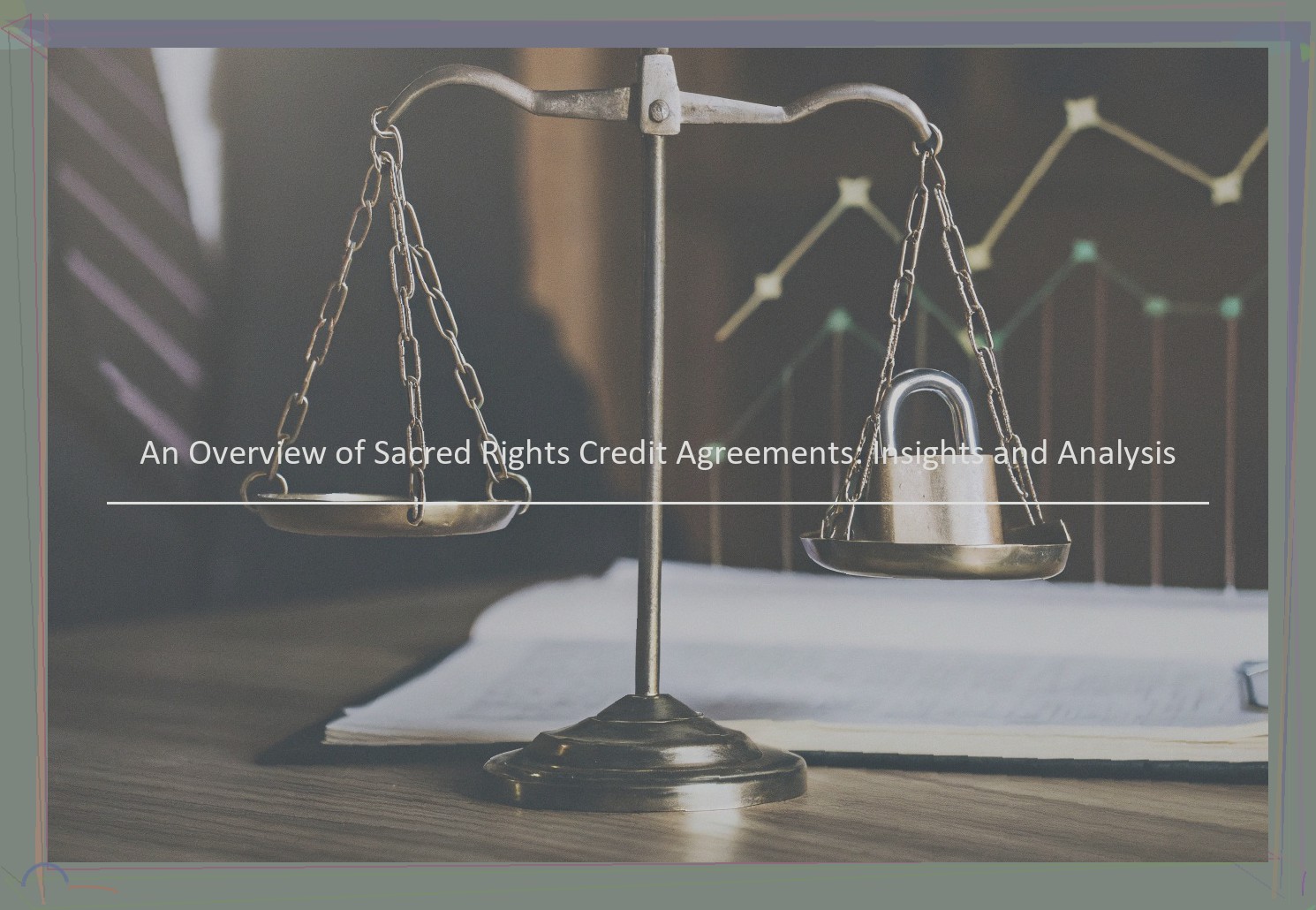
What are Sacred Rights?
The term "sacred rights" is defined as "the right of the holder of a security interest or other creditor under an agreement that encumbered property shall not be sold or otherwise disposed of except in certain specified manner and subject to specified conditions." The terms "sacred rights" and "sacred assets" are often used interchangeably. They encompass rights you have as a secured creditor, such as the right to exercise remedies or be paid proceeds from the disposition of collateral . In term sheets for a new loan or documents accompanying the purchase of a distressed company, you might see a list of prohibitions on acts by the company or its lenders, bondholders, and may include limitations on entrepreneur salaries, bonuses, acquisitions, investments and capital expenditures. It is important that investment professionals receive covenant compliance certification, such as with sacred rights credit agreements to ensure the sacred rights accompanying the loan will be properly enforced.
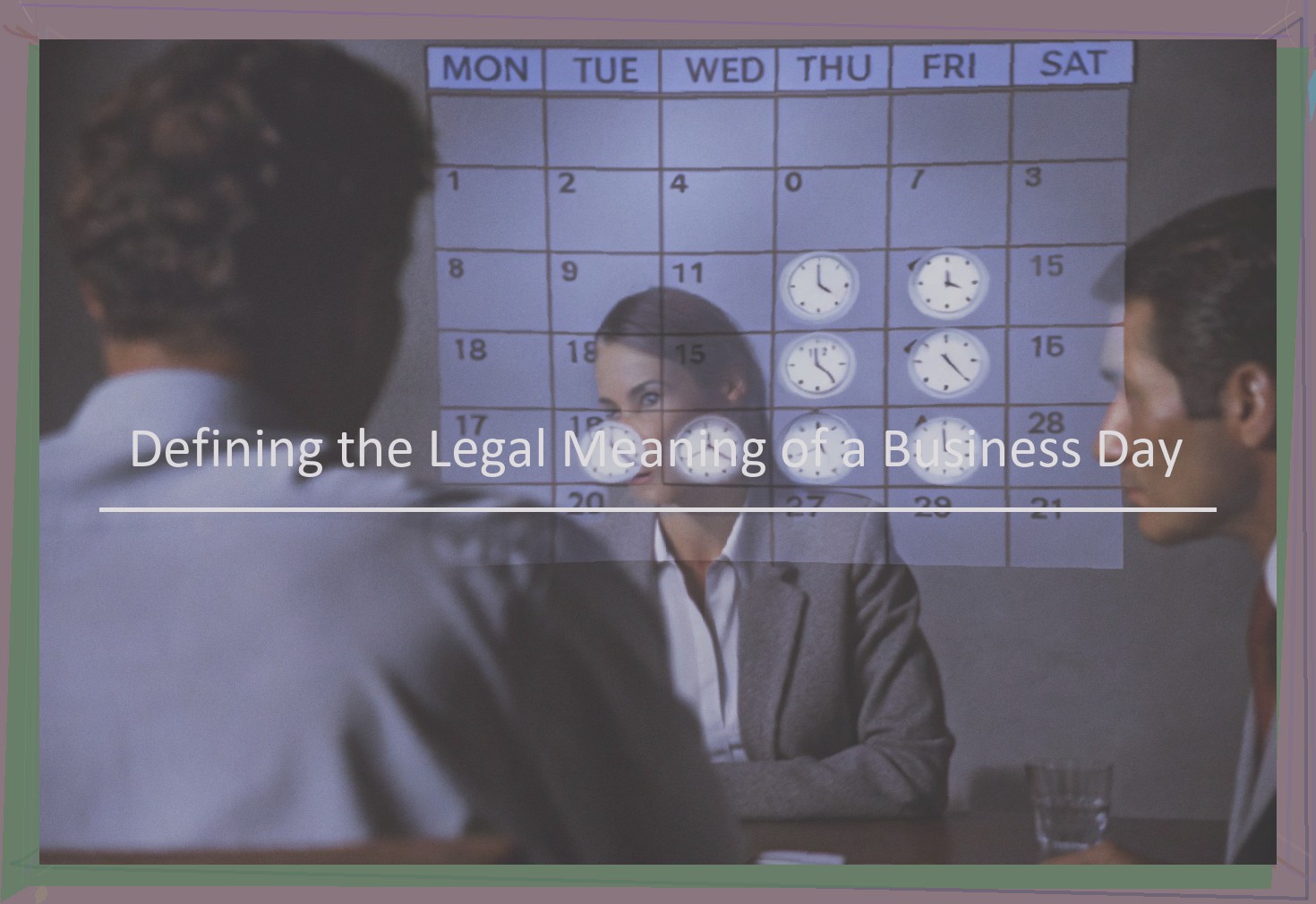
What Is Considered a Business Day in Legal Terms?
Generally, a "business day" is a day on which the normal operations of a business are conducted. Generally, to be considered a business day in the context of the law, the day must not be a Saturday, Sunday, or an official recognised public holiday. A "business day" may therefore refer only to the regular working hours of the business, potentially excluding work carried out in the evenings or on weekends. In some cases, the definition of a "business day" is expanded. In the construction world, for example, the definition of a business day encompasses Saturdays and, if the employment contract states it, Sundays and recognised public holidays . In other cases, the definition encompasses only weekdays. The statutory concept of a "business day" has been discussed and defined by the Courts in some court cases. In the case of Sheriff of Fife v Fife Industrial & Provident Society Ltd. (1988), Lord President Emslie stated that "the term `business days’ is used colloquially to denote normal working days; that is to say, days on which no legal obstacle or other practical impediment to ordinary trade exists". He referred to a "legal impediment" as a bank holiday or a public holiday.
An Overview of Prenuptial Agreements in Colorado
In the world of family law, a thoughtful approach to creating security and certainty is of the utmost priority. As families undergo significant change, whether through divorce or marriage, thoughtful planning and preparation enable individuals and families to remain focused. In Colorado, premarital, also known as prenuptial, agreements carry legal force and often serve as the basis for a successful relationship. Premarital agreements can be a valuable asset that promote effective negotiation of issues that may later arise . A prenuptial agreement in Colorado is a lawful contract between prospective spouses, which regulates aspects pertaining to property, financial obligations and support obligations. Colorado law is very permissive regarding prenuptial agreements and can regulate many aspects of the marital estate. As a valid contract, the agreement must be entered into voluntarily, be based upon full financial disclosure and be conscionable at the time of execution and when enforcement is sought. A prenuptial agreement, like other contracts, can be challenged and potentially invalidated based upon fraud and other defenses.
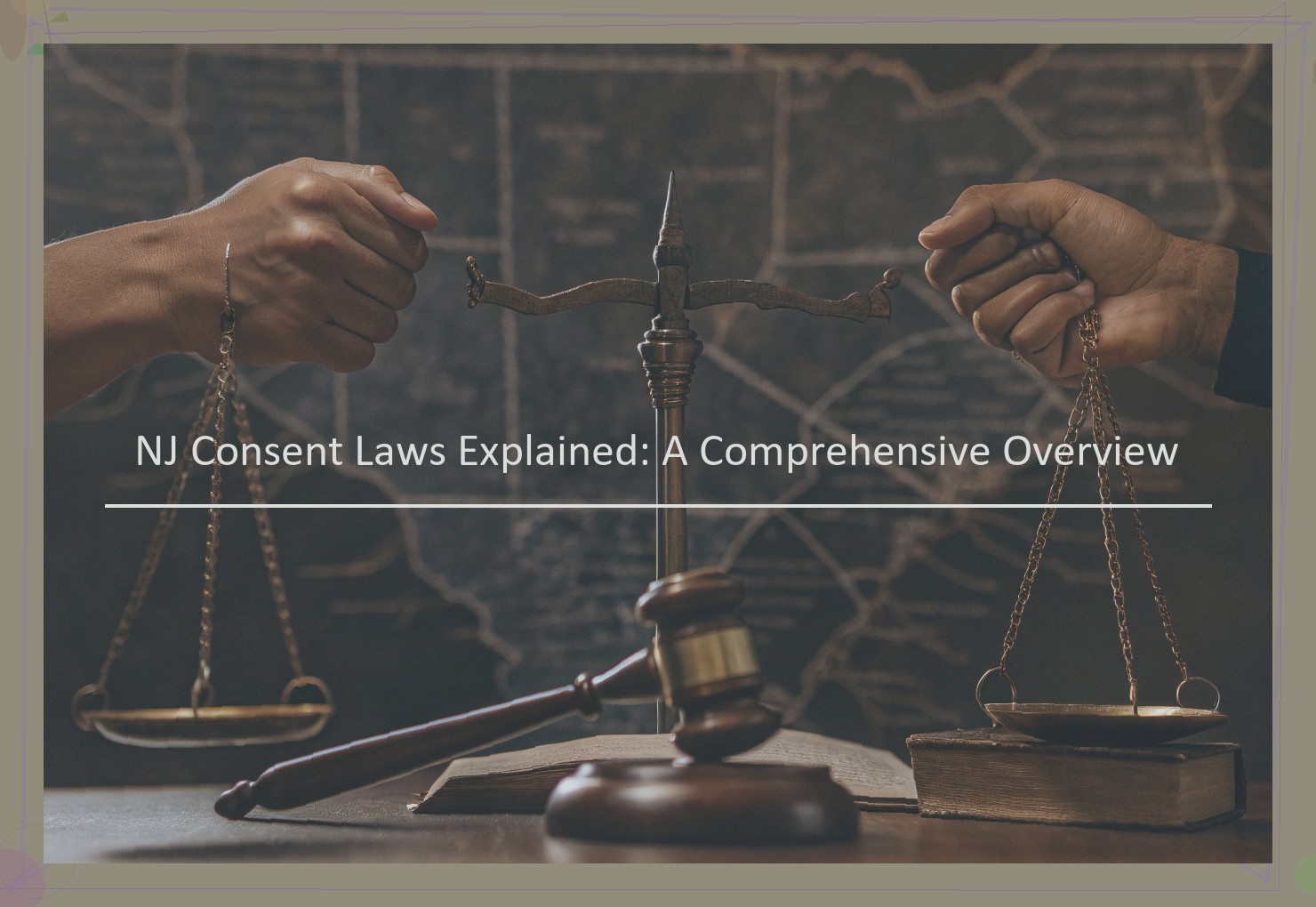
Introduction of NJ Consent Laws
Entering into relationships with sexual intimacy is a natural and healthy part of being human. However, with that intimacy comes important legal considerations. The New Jersey Code of Criminal Justice, titled Title 2C, contains various laws pertaining to sexual intimacy, including laws regarding consent. Understanding New Jersey’s consent laws will help you in both avoiding legal entanglements, and also understanding what you can legally do.
Consider, for example, the situation where a person has intercourse with another person under a false pretense. One person may want to have sex, while the other person has no knowledge of the others’ intention. One party may come to truly believe that they are with the love of their life, while the other person may simply be looking for an opportunity to have casual sex. Having intercourse or engaging in any sexual activity while either person is under a false pretense can be criminal fraud, with serious consequences.
NJ consent laws are detailed throughout Title 2C, and include laws related to statutory rape (consent cannot be given by a person who is younger than the age of consent), sex between adults and minors, clergy sexual misconduct, sexual coercion and bribery, and many more. In certain circumstances, even if consent was legitimately given, an argument can be made against the legality of the transaction. This is particularly true in cases involving minors, where consent can be given legitimately but the minor was not of legal age to give consent for such particular activity.
For example , while a 16 year old may consent to sexual activity, she cannot consent to endangerment of children under NJ law, even if she agrees to participate in any type of sexual activity with a younger child. This is because a 16 year old lacks the legal authority to determine what is harmful to a child, and therefore cannot give consent to harm children.
Talking about consent in the context of sex is very complicated, not only in New Jersey, but throughout the world. There can be a fine line between consenting, and using the threat of violence to prevent a defendant from leaving a sexual situation. Even though saying "no" or trying to leave a room can mean no more than it feels, in today’s political climate even a quote from The Simpsons can end up on the president’s twitter feed.
It is also difficult to define consent. Does someone who is too drunk to stand up or lawfully drive, consents to sex? What if that alcohol leads to a blackout, and the person can’t remember the details of the encounter? Certainly, taking advantage of someone who is too drunk to stand up or legally consent to sex is illegal under NJ law.
Determining consent can be difficult, but New Jersey courts have dealt with these issues before. The legal issues surrounding consent won’t be going away anytime soon. For now, the best course of action is to understand New Jersey’s laws relating to consent, what they can mean for you and your partner, and avoid the pitfalls associated with consent.
Law Firm Acquisitions and Sales
In order to understand what it means for a law firm to be for sale, it helps to define some terms. Generally speaking, a "law firm for sale" is a firm that has retained a business broker to help in the process of selling the firm. The term "for sale" does not necessarily mean that the owner of the firm wants to sell, only that the firm has been placed on the market for sale. There are many reasons why a law firm would be placed on the market for sale. Frequently, it is due to what is typically called a "burnout" scenario. A firm owner may "burn out" from practice and feel they no longer want to or cannot continue to maintain the types of hours required to run a firm, sometimes due to health reasons or just a change in life circumstances. Many older attorneys who have a book of business decide to sell their firms due to a number of issues . Sometimes firm owners find themselves with one or more partners who are no longer up to the task due to health issues or retirement, and the remaining owners decide to sell a firm that is suffering from a reduction in available talent. Likewise, when practice areas go out of favor, headquarters offices are closed, and associate lawyers are laid off or asked to leave, a firm may have no choice but to reduce its size or dissolve entirely.
The sale of a law firm can be more complicated than selling most other businesses for a number of reasons. Law firms are unique in that their employees (the lawyers) are also the "clients" of the firm. Selling a law firm can cause internal friction if proper care is not observed. Also, the rules governing the ownership and operation of a law firm vary from state to state. For example, certain states have laws prohibiting non-lawyers from owning an interest in a law firm.
Defining Common Areas
Common area is defined as the parts of a rental property that are kept for the joint use of tenants. While what is and is not considered a common area may vary between different spaces, you can generally consider anything that is not inside your physical office or workspace to be part of the common area. When you read the lease agreement, you may see sections referenced that you do not fully understand. Usually, an example or two does the trick to clear it up. In an office building, the common areas might include hallways, elevators, stairwells, bathrooms, lobbies, reception areas, breakrooms and parking lots . In a retail building, the common areas might include hallways, exterior access areas, public areas on and surrounding the building, parking lots and any other area meant to provide access to the building. In a multi-family residence, the common areas might include stairwells, parking lots, laundry rooms, pool areas, fitness centers and other areas that tenants of the residence are permitted to access. The commons areas of a rental property can affect many different areas of your relationship with your landlord.
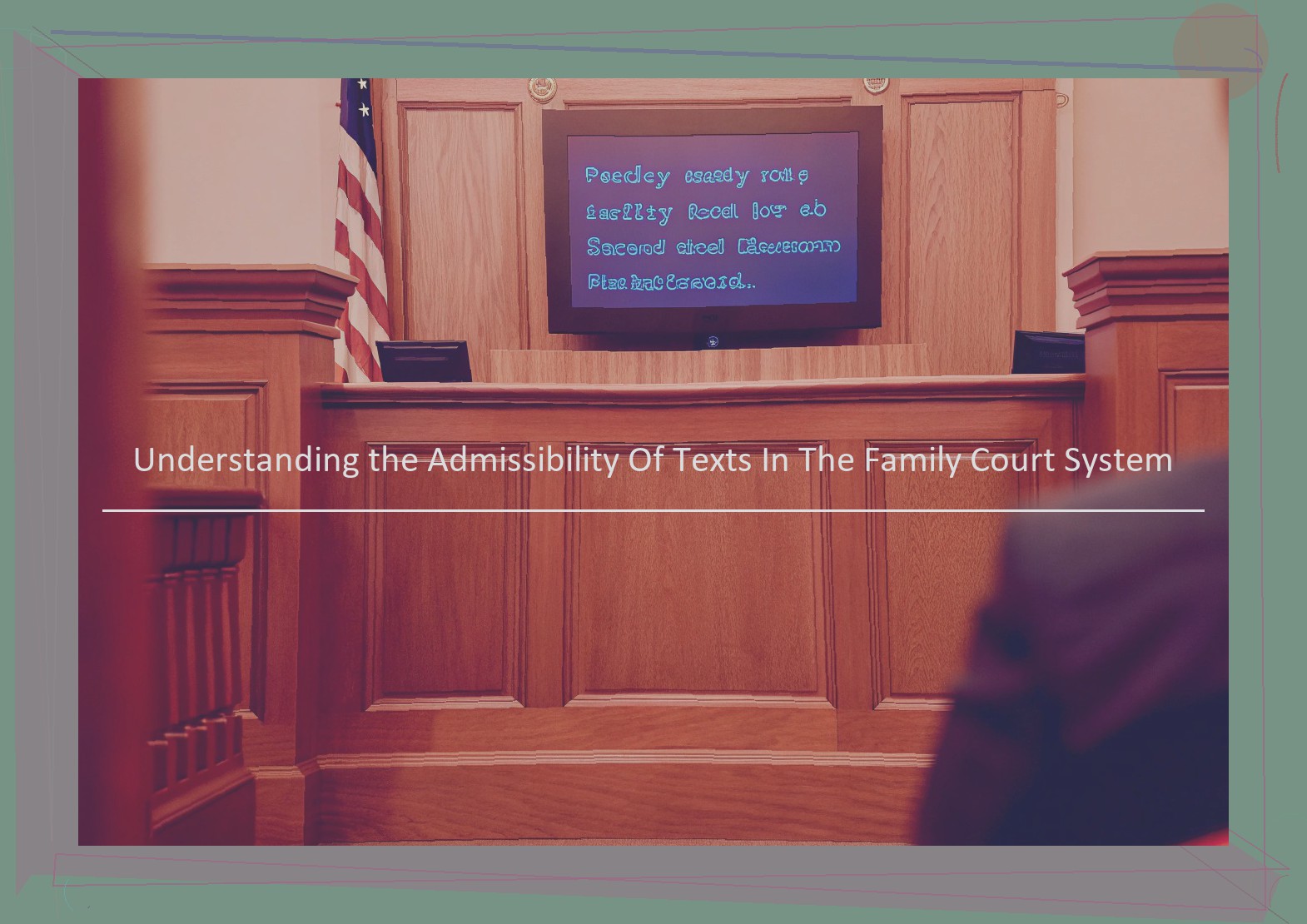
Can Texts Be Admissible In Court?
Admissibility of text messages in family court is governed by the rules of evidence. Generally speaking, text messages are considered written documents and are admissible in court provided there is a proper showing as to their authenticity. Much of the law applicable to text messages is derived from general laws applicable to electronic records and electronic signatures which is codified in 15 U.S.C. § 7001 et seq. and accompanied by regulations in 31 C.F.R. § 501 et seq. Neither statute nor regulation addresses admissibility specifically. Nevertheless, "The general rule is that if the contents of a writing are raised in issue, that writing is admissible as long as the proper production and authentication foundation is laid." State v. Dingman, 283 Neb. 774, 775, 814 N.W.2d 984, 986-87 (2012), citing State v. Smith, 274 Neb. 285, 740 N . W.2d 733 (2007). See also State v. Olshan, 292 Neb. 849, 872 N.W.2d 689 (2015); VRT, Inc. v. Gibbons, 274 Neb. 646, 741 N.W.2d 407 (2007). Authentication can be accomplished through evidence demonstrating the authenticity of the content of the writing itself. Nebraska Evidence § 901.05. The district court’s consideration of admissibility of text messages in Olshan was appellate as that case was originally tried in county court. In Olshan, the defendant asserted the authenticity of a text message thread through the use of the witness who sent and received the text messages. In that case, the appellate court noted that the messages were "not considered ‘electronic records’ within the meaning of the Federal E-Sign Act." Id. at 861, citing 15 U.S.C. § 706. Thus, the analysis under the E-Sign Act was inapplicable to Olshan.
What Exactly Is a PLLC?
PLLC stands for Professional Limited Liability Company. A PLLC is a limited liability company that is formed for the purpose of providing professional services. Practitioners in many professions can form a PLLC, for example, accountants, architects, engineers, health care professionals, lawyers and medical professionals.
Unlike traditional limited liability companies, PLLCs are regulated by the State. The states follow the concept of "professional malpractice" as oppose to "ordinary liability" to determine whether a facility should be formed as a PLLC. A PLLC must have all the members licensed in the same profession. In many states , if practitioners in several related fields want to practice together, they form a PLLC that contains those practitioners. For example, an architect can form a PLLC with an engineer and an environmental planning firm. However, professionals that are only tangentially related, cannot form a PLLC. For example, a lawyer cannot form a PLLC with an architect because those professions are not closely or inherently related – a lawyer does not rely on an architect for the lawyer to practice law.
An Introduction to Arizona’s Knife Laws
A complex history, not unlike the neighboring state of Texas, paved the way for knife rights in Arizona. Prior to 2006, Arizona knife law could be summed up using only one word: criminal. But recent legislative strides have removed more restrictions on what Arizonians can legally carry, both openly and concealed.
The catalyst for change was the 2005 decision in Arizona repealing bans on the sale and possession of automatic knives, or "switchblades" as they are commonly called. Under the prior law, you could be charged with a Class 2 Misdemeanor for possession or sale of an automatic knife unless you were selling it to a police officer or in a limited set of situations. However, the ban was ruled unconstitutional after a challenge by five knife manufacturers.
No sooner had police gotten the memo than knife rights advocates got to work updating Arizona knife laws to address the treatment of knives in general. The legislature responded by passing A.R.S. § 13-3120 (which once gratefully appears in A.R.S. § 13-3101). Among the new definitions introduced was the phrase "deadly weapon," which encompasses knives with blades greater than five inches . Regardless of an area’s classification as a city, town, village, or unincorporated community, municipalities are allowed to require a municipal business license from both permanent and temporary knife sellers. To add another layer, knife legislation is not handled at the state level, but rather by counties; counties may still impose their individual restrictions on knife possession, deadly or otherwise.
Arizona knife law has a few other noteworthy points. A.R.S. § 13-3102 makes it a Class 1 Misdemeanor to carry a deadly weapon in a crowded place, to commit a deadly weapon assault, or to possess a deadly weapon if you’re an inmate or dischargee from prison or jail. Likewise, you cannot sell a deadly weapon to someone if you know them to be an inmate or parolee. A.R.S. § 13-3103 gives municipalities the power to impose restrictions on areas where knives are prohibited – for example, poison centers, where staff are likely to be busy trying to save your life if a deadly weapon has cut you. Only a few cities and towns, including Superior and Sedona, maintain these restrictions.
As a result of Arizona’s post-2005 legislative activity, knives are more limited by size than by type. Unlike nearby Colorado, which draws a distinction between different kinds of bladed instruments, Arizona law applies to all knives equally.
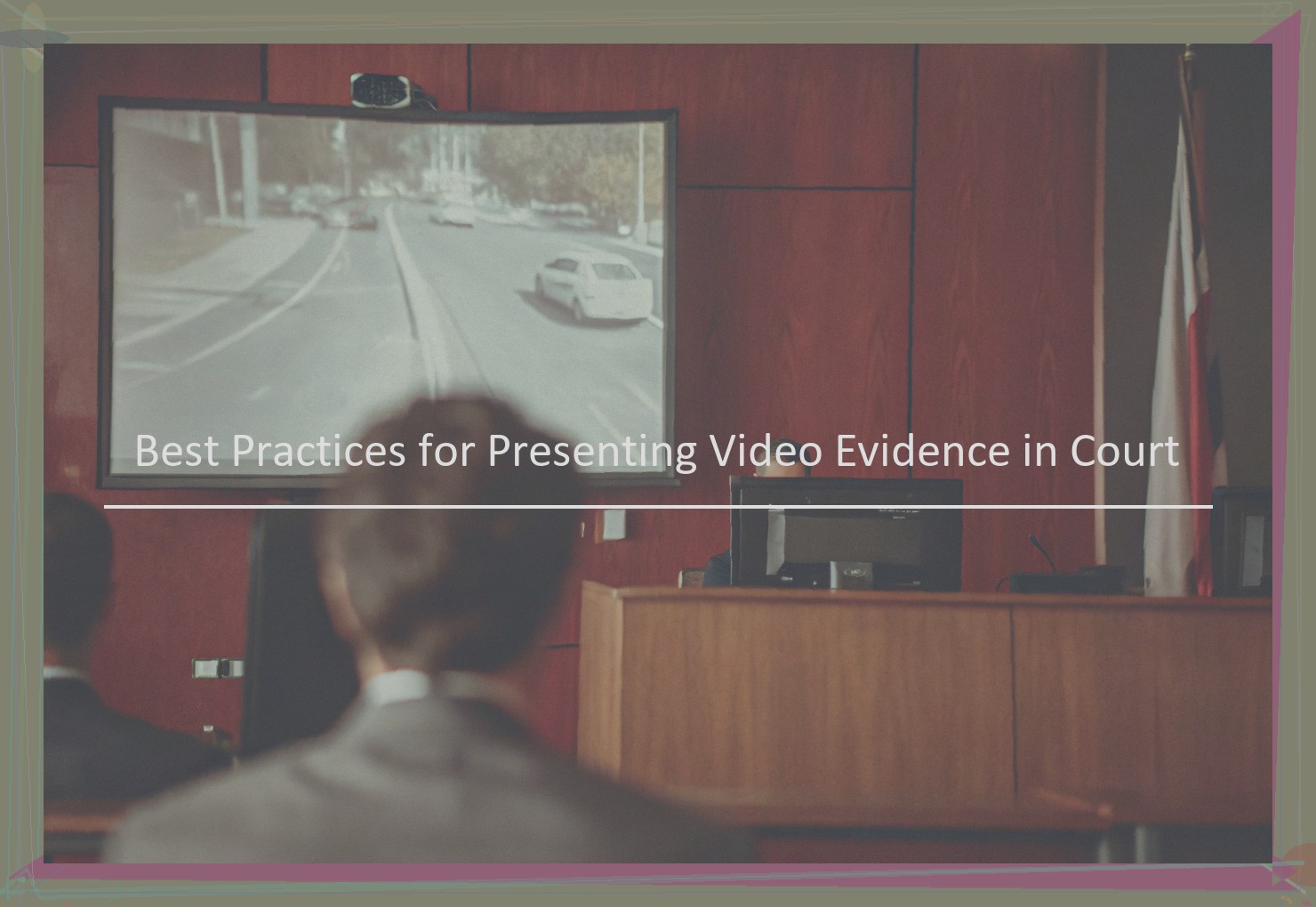
The Basics of Video Evidence
Video evidence is recorded visual and/or audio material that is submitted in a court of law to corroborate or dispute the claims of either or both parties. Video evidence can be used as a means of presenting testimony in a way that minimizes the likelihood of misinterpretation. As the prevalence of video recording devices increases, more tend to find their way into courtrooms and become vital pieces of evidence. Video evidence is important in court because it often serves as an indisputable means of showing what happened in a given situation . While living witnesses may have their own biases, and memories are subject to alteration over time, video evidence shows events as they truly happened and often cannot be disputed.
Video evidence commonly used in courtrooms may come from security footage, cellphone video, body cameras or traffic cameras, among other sources. These sources are often some of the most commonly subpoenaed forms of video evidence. Subpoena refers to a court order that, in this case, requires a party to bring physical evidence to the courthouse.
